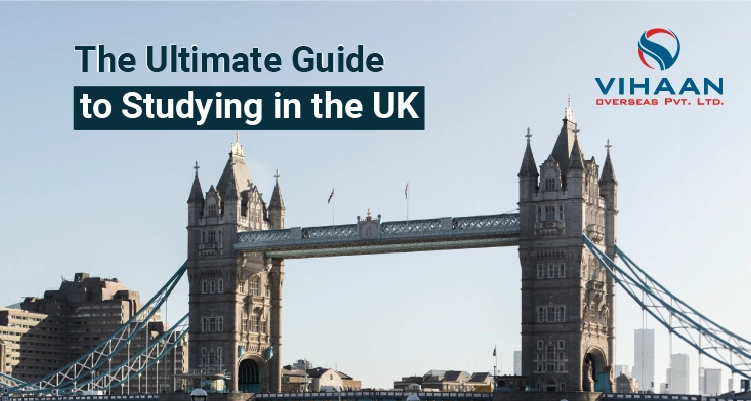
Job Opportunities in Australia: A Complete Guide
November 6, 2024
Top 10 Countries for Indian Students to Study Abroad
December 19, 2024Studying in the UK is a dream for many Indian students. And why wouldn’t it? The UK offers globally recognized study programs with quality education and top universities like Cambridge and Oxford. However, many students who want to study in the UK lack proper guidance.
If you’re one of the students looking to know in detail about studying in the UK, we are here to help you with the right courses, top universities, benefits of studying in the UK and complete directions on the UK student visa process.
Read this blog and get the ultimate guide to studying in the UK. Let’s begin!
Why Study in the UK?
Studying in the UK is one of the best decisions you can make because the UK provides an endless number of career opportunities in various fields with global environment to grow.
The quality of education with a focus on developing interpersonal and soft skills of students is a plus if you’re studying in the UK. Educators in the UK positively and continuously encourage students, guiding them to make a successful career.
As you may know, the globally ranked universities in the UK provide practical education and real-world skills, you can be sure about your post-study work opportunities not just in the UK, but all over the world!
Over 6K plus international students choose to study and build their career in the UK, because of the UK’s warm welcoming approach to students by helping them through scholarships and funding choices!
Let’s look at the top ten reasons why you should study in the UK.
Top 8 Reasons to Study in the UK
1. Academic Quality
With a diverse range of courses, studying in the UK comes with a world-class academic quality in your education abroad in the UK. Whether you choose bachelor's degrees, master's degrees, doctoral, PhDs or vocational courses, the quality of study is commendable in the UK.
2. Course Variety
Many UK institutions offer students the freedom to customize their courses, including subjects of their interest, and provide a variety of academic courses with job training and a personalized skill set.
3. Research Opportunity
Various UK universities have extensive scientific research opportunities. There are several universities that provide advanced facilities and resources to students for one step further study in their respective discipline.
4. Work Opportunities
The key reason to study in the UK is that students can work while studying or after they get their undergraduate or graduate degree.
5. Explore Europe
The best part of studying in the UK is that you can explore other parts of Europe like Paris, London, Switzerland, Germany, Spain, Greece, Italy, and others.
6. Individual Development
Studying in the UK comes with a lot of extra perks! One of them is you get so much to learn, acquire, and develop your overall personality. You can build various skills while having your academic program going on.
7. Language Skills
Studying in the UK can help you develop your English language skills and your chances of getting jobs globally increase.
8. Diverse Culture
Students come to the UK across the globe with diverse cultures and customs for studying. This diversified culture environment teaches you unique values and lessons.
Top 7 Benefits of Studying in the UK
1. Easy Visa Process
The main benefit for the overseas students planning to study in the UK is the easy visa process of UK. Unlike other countries, the UK has a very straightforward student visa process.
2. Shorter Course Duration
Many colleges and universities in the UK provide short-term courses in most subjects. This benefits students by getting affordable fees rather than high fees of longer programs.
3. Various Scholarships
The study fees in the UK are lower, and you can cut your overall study costs in the UK by getting various financial aid and scholarships. Many UK universities offer scholarships to students that cover their living expenses and tuition fees.
4. Work while Studying
This is one of the best advantages for students that you can work part time while having an academic course going on. This way you can cover your living expenses. However, you can work up to 20 hours maximum a week.
5. Acclaimed Career
A great advantage of studying in the UK is that you get a two-year post-study visa. With this visa, you can stay and build your career in the UK.
6. Subject Flexibility
Students in the UK can choose the courses they wish to study. This allows them to grow their knowledge and skills based on their interests, be creative and learn new skills in their own way.
7. Healthcare & Other Benefits
Overseas students get healthcare, insurance and other benefits by having a UK study visa. While studying in the UK, international students can receive free medical treatment.
Top 10 Universities in the UK
1. London School of Economics & Political Science
It is one of the best institutes for economics, law and social sciences in the world and located in London.
2. University of Oxford
The University of Oxford is famous for humanities, law and MBA courses in the world and located in South England.
3. University of Cambridge
The University of Cambridge is in Central England and is particularly known for its Mathematics and Computer Science courses.
4. The University of Manchester
The University of Manchester is located in North England. Established 1824, the university offers the best courses in Chemical Engineering and Data Science.
5. Imperial College London
Imperial College in London is known for Science, Engineering and Medicine courses.
6. University College London (UCL)
UCL is famous for Medicine, Science and Law courses.
7. University of Warwick
The University of Warwick is in Central England and renowned in the field of international studies, law and business.
8. University of Bristol
The University of Bristol is in South England and popular for its courses in engineering, medical sciences, and arts.
9. University of Edinburgh
The University of Edinburgh is in Scotland and known for its courses of MBA, veterinary medicine, engineering, etc.
10. University of St. Andrews
The University of St. Andrews is in Scotland and its famous for international relations, computer science and physics courses.
Best 10 Courses to Study in the UK
Here we are discussing the top ten courses to study in the UK with the popular courses among the field, average annual tuition fees, top universities for the course, job opportunities, expected annual salary after the course.
1. Business Analytics
| Category | Details |
|---|---|
| Courses |
|
| Average Annual Tuition Fees | £18,000 - £29,500 (INR 18,24,500 - INR 29,90,100) |
| Best Universities |
|
| Job Opportunities |
|
| Expected Annual Salary | £47,302 (INR 47,94,600) |
2. Data Science
| Category | Details |
|---|---|
| Courses |
|
| Average Annual Tuition Fees | £19,000 - £40,000 (INR 19,25,800 - INR 40,54,400) |
| Best Universities |
|
| Job Opportunities |
|
| Expected Annual Salary | £52,000 (INR 52,70,800) |
3. Computer Science
| Category | Details |
|---|---|
| Courses |
|
| Average Annual Tuition Fees | £20,000 - £43,000 (INR 20,27,200 - 43,58,500) |
| Best Universities |
|
| Job Opportunities |
|
| Expected Annual Salary | £35,000 (INR 35,47,600) |
4. MBA and Master’s in Management (MIM)
| Category | Details |
|---|---|
| Courses |
|
| Average Annual Tuition Fees | £40,000 - £1,00,000 (INR 40,54,400 - 1,01,36,100) |
| Best Universities |
|
| Job Opportunities |
|
| Expected Annual Salary | £35,000 - £65,000 (INR 35,47,600 - 6,58,85,100) |
5. Bachelor of Medicine, Bachelor of Surgery
| Category | Details |
|---|---|
| Courses |
|
| Average Annual Tuition Fees | £22,000 - £52,000 (INR 22,29,900 - 52,70,800) |
| Best Universities |
|
| Job Opportunities |
|
| Average Annual Salary | £40,000 - £90,000 (INR 40,54,400 - 91,22,500) |
6. Finance, International Business, and Accounting
| Category | Details |
|---|---|
| Courses |
|
| Average Annual Tuition Fees | £20,000 - £45,000 (INR 20,27,200 - 45,61,200) |
| Best Universities |
|
| Job Opportunities |
|
| Expected Annual Salary | £40,000 onwards (INR 40,54,400) |
7. Law
| Category | Details |
|---|---|
| Courses |
|
| Average Annual Tuition Fees | £19,500 - £44,000 (INR 19,76,500 - 44,59,900) |
| Best Universities |
|
| Job Opportunities |
|
| Expected Annual Salary | £20,000 - £70,000 (INR 20,27,200 - 70,95,300) |
8. Architecture and Construction Management
| Category | Details |
|---|---|
| Courses |
|
| Average Annual Tuition Fees | £17,000 - £40,000 (INR 17,23,100 - 40,54,400) |
| Best Universities |
|
| Job Opportunities |
|
| Expected Annual Salary | £25,000 - £65,000 (INR 25,34,000 - 6,58,85,100) |
9. Engineering
| Category | Details |
|---|---|
| Courses |
|
| Average Annual Tuition Fees | £14,000 - £50,000 (INR 14,19,000 - 50,68,000) |
| Best Universities |
|
| Job Opportunities |
|
| Expected Annual Salary | £40,000+ (INR 40,54,400+) |
10. Fashion and Interior designing
| Category | Details |
|---|---|
| Courses |
|
| Average Annual Tuition Fees | £10,000 - £30,000 (INR 10,13,600 - 30,40,800) |
| Best Universities |
|
| Job Opportunities |
|
| Expected Annual Salary | £20,000 - £115,000 (INR 20,27,200 - 1,16,56,500) |
Cost of Studying in the UK
1. UK Student Visa Cost
To get a UK Student Visa, consider costs and eligibility requirements. The application fee is GBP 490. Criteria: minimum age 16, admission letter from UK university, enough funds, or scholarship, parental consent if under 18. Meeting these ensures a smoother application for studying in the UK.
2. Cost of Education in the UK
Studying in the UK for Indian students can have varying costs depending on the program and institution. The prestigious Russell Group universities, similar to the Ivy League, include renowned institutions like LSE, Cambridge, and Oxford with international tuition fees ranging from GBP 26,500 to GBP 50,835 annually.
Private universities in the UK, such as Buckingham and St. Mary's, offer more affordable options with tuition fees of GBP 6,000 to GBP 24,000 per year, making them suitable for budget-conscious students.
3. Cost of Living in the UK
Living expenses, including housing, food, travel, bills, and daily activities, are a significant part of studying in the UK. For Indian students, the monthly living cost in London is around GBP 1,300–1,400, while in other parts of the UK, it ranges from GBP 900–1,300. Accommodation costs vary, with student halls in London costing GBP 848 per month and private room rentals being more economical at GBP 750 in London. Other expenses include bills, groceries, transport, and mobile phone bills.
(Source: British Council)
4. Total Cost of Studying in the UK
Indian students investing in higher education in the UK face significant expenses ranging from INR 24 lakhs to INR 55 lakhs, including pre-arrival and post-arrival costs. Key expenses include university application fees of INR 2,102–9,463, a student visa fee of INR 51,522, immigration health surcharge of INR 49,419, airfare of INR 27,887–80,000, tuition fees of INR 6,31,499–53,50,378, and living expenses of INR 11,75,970–16,40,302 per year. Scholarships, part-time work, and funding options can help manage these costs effectively.
(Source: British Council)
UK Student Visa Process
1. Choosing Visa Type
Short-term study visas are available for adults over 18 enrolled in short courses, with most allowing a 6-month stay and English courses extending to 11 months. Longer courses require the university to have a Student Sponsor License. Children aged 4-17 attending independent schools can apply for a child student visa, while those 16 and older can apply for a general student visa in the UK.
2. Qualification & Eligibility
To apply for a UK student visa, students must be at least 16 years old and have been accepted into a course at a UK educational institution. The application must be submitted three months before the course starts or up to one week prior for shorter courses. Eligibility requires confirmation of enrolment, acceptable English proficiency scores, and proof of financial support. The maintenance funds needed are £1,334 per month in London and £1,023 outside London.
3. Required Documents
To apply for a visa, you need a current passport, proof of funds, CAS reference number, photos, TB screening, assessment docs, ATAS clearance (if needed). Additional documents may be required if not a citizen of the applying country, under 18, or has dependents. Contact IDP counselor for a full list. Non-English docs must be translated with date, translator's info, and confirmation of accuracy.
4. Online Application
International students must apply for a Tier 4 (General) student Visa to study in the UK. Steps include obtaining CAS, completing the online application, paying fees, submitting application, collecting passport, and collecting Biometric Residence Permit in the UK.
5. Fees & Other Payments
The current fee for a student visa is £490 (~US$620) if applying outside the UK or extending/switching visas from inside. A healthcare surcharge of £470 (~US$594) per year for access to the NHS is also required. Payment methods include online, demand draft, or cash at specific locations.
6. English Language Proficiency
In the UK, most universities ask for at least a 6 in IELTS. However, pathway and foundation courses can accept a score of 5.5. Some UK institutions may also waive the IELTS requirement if students have good English scores from their 12th grade.
7. Biometric Residence Permit
You need to get a biometric residence permit (BRP) from UKVI as part of your application. To do this, schedule an appointment with UKVI to have your fingerprints scanned and a digital photo of your face taken.
Post-Study Work Opportunities
1. Skilled Worker
Students after completing their studies can be eligible for skilled based jobs like accountants, management professionals and other qualified experts. However, you need to get the Skilled Worker Visa to work in the UK after your study visa ends.
2. Entrepreneur or Business Owner
With Entrepreneur visa, graduates can also start their own business and entrepreneurship to establish and operate their business in the UK.
3. Researcher or Scientist
Students specialized in scientific research or academia can work as a researcher and a scientist and contribute to their field via Global Talent Visa.
4. Start Up Founder
You can also work on your Start Up idea and become Start up founder after your studies with Graduate Route visa or Entrepreneur visa.
Why Choose Vihaan Overseas to Study in the UK?
All in all, if you are clear by mind why should you go to UK for studying, then wait not and choose Vihaan Overseas for your dream journey to study in the UK. We are a leading study aboard consultant in Gandhinagar. From IELTS coaching classes to getting your visa application approved, we cover your every need in this path of going one step ahead and start your educational journey in the UK!
Connect with us and let us know more about your dream of going to study in the UK, our team will clear your doubts and everything in between!
Bottom Line
As you are now clear with everything about studying in the UK whether it is top universities, courses, visa process or post-study works, we have discussed in detail about studying in the UK.
Still, if you have even a single question, Contact Us! Vihaan Overseas is here to ease your study abroad journey including major countries across the globe. If you want to Study in UK, choose us and let’s make your dream come true!
FAQs
Yes, you can work while studying with a UK student visa but there are rules based on your field of study and term time.
You can take roles like sabbatical officers in the student union, but you cannot be self-employed, play sports professionally, or access public funds. Generally, you can work part-time for up to 20 hours a week while following immigration laws.

















